英语常用句型(熟记1)
人教版四年级下册英语句型
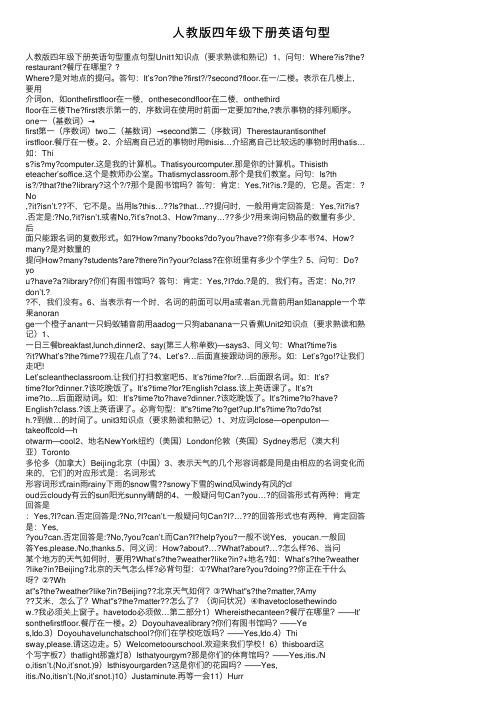
⼈教版四年级下册英语句型⼈教版四年级下册英语句型重点句型Unit1知识点(要求熟读和熟记)1、问句:Where?is?the? restaurant?餐厅在哪⾥??Where?是对地点的提问。
答句:It’s?on?the?first?/?second?floor.在⼀/⼆楼。
表⽰在⼏楼上,要⽤介词on,如onthefirstfloor在⼀楼,onthesecondfloor在⼆楼,onthethirdfloor在三楼The?first表⽰第⼀的,序数词在使⽤时前⾯⼀定要加?the,?表⽰事物的排列顺序。
one⼀(基数词)→first第⼀(序数词)two⼆(基数词)→second第⼆(序数词)Therestaurantisonthef irstfloor.餐厅在⼀楼。
2、介绍离⾃⼰近的事物时⽤thisis…介绍离⾃⼰⽐较远的事物时⽤thatis…如:This?is?my?computer.这是我的计算机。
Thatisyourcomputer.那是你的计算机。
Thisisth eteacher’soffice.这个是教师办公室。
Thatismyclassroom.那个是我们教室。
问句:Is?this?/?that?the?library?这个?/?那个是图书馆吗?答句:肯定:Yes,?it?is.?是的,它是。
否定:? No,?it?isn’t.??不,它不是。
当⽤Is?this…??Is?that…??提问时,⼀般⽤肯定回答是:Yes,?it?is? .否定是:?No,?it?isn’t.或者No,?it’s?not.3、How?many…??多少?⽤来询问物品的数量有多少,后⾯只能跟名词的复数形式。
如?How?many?books?do?you?have??你有多少本书?4、How? many?是对数量的提问How?many?students?are?there?in?your?class?在你班⾥有多少个学⽣?5、问句:Do? you?have?a?library?你们有图书馆吗?答句:肯定:Yes,?I?do.?是的,我们有。
英语作文常用句型

[英语作文常用句型]一、开头句型我们常说,良好的开端等于成功的一半。
做事如此,作文也是如此。
所以我们颇有必要在作文的开头花一番心思。
在写议论文时,你通常以什么样的方式开头呢?最简单也最常用的可能就是开门见山法。
也就是说———直截了当地提出你对这个问题的观点,点出文章的中心思想。
I....has both advantages anddisadvantages.……既有利又有弊。
例如:1.Obviously television has both advantages and disadvantages.2.Living in a city has both advantages and disadvantages.3.Com pared with cars,bikes have their advantages and disadvantages.举一反三:1.Although computers bring people a lot of convenience,they have many disadvantages.2....has many advantages.For example,...However,just as everycoin has two sides,...has itsdisadvantages.(本例将利弊分开讲,转折过渡自然。
just as every coin has two sides 也很值得背诵。
)II....play(s)an important role /partin...……在……中扮演重要角色/起重要作用。
例如:1.Computers play an important role in science and technology.2.Computers play a more and more important role in our life.Computers play an increasingly important role in our studies.3.Education plays an important part in developing our mind.4.Addiction to alcohol and drugs play a role in homelessness.举一反三:1.Advertisement plays an informative role in our daily life.2.In the past,letters played a decisive role in long-distance communication.But now ,telephone,email,fax have taken their place.III.With the development of...,随着……的发展,例如:1.With the developm ent of our econo- m y,m any Chinese fam ilies canafford a car.2.With the development of our economy and society,pollution is moreand more serious.3.With the rapid development of science and technology,people can geta college degree by taking online-courses at home.4.With the current social and technological developments,employeeswith more knowledge and higher academic degrees are needed.举一反三:1.With the rapid increase of China's population,housing problem isbecoming more and more serious.随着中国人口的急剧增加,住房问题越来越突出。
常用的交际英语口语短句

【导语】交际,即⼈与⼈之间的交往,通常指多⼈通过语⾔、⾏为等表达⽅式进⾏交流意见、情感、信息的过程。
以下是⽆忧考整理的常⽤的交际英语⼝语短句,欢迎阅读!1.常⽤的交际英语⼝语短句 1、I‘m home.我回来了。
2、I quit! 我不⼲了! 3、Let go! 放⼿! 4、Me too.我也是。
5、My god! 天哪! 6、No way! 不⾏! 7、Come on.来吧。
8、Hold on.等⼀等。
9、I agree。
我同意。
10、Not bad.还不错。
11、Not yet.还没。
12、See you.再见。
13、Shut up! 闭嘴! 14、So long.再见。
15、Why not? 为什么不呢? 16、Allow me.让我来。
17、Be quiet! 安静点! 18、Cheer up! 振作起来! 19、Good job! 做得好! 20、Have fun! 玩得开⼼!2.英语⼝语如何进⾏⾃学 ⼀、练习听⼒,并模仿发⾳ 想要⾃学英语⼝语和掌握⼝语学习的技巧,就必须学好听⼒。
想要练习听⼒,还必须强化⼝语,因此听和说这两⽅⾯是互补的。
在练习英语听⼒时,要注意仔细分辨外国⼈的发⾳,然后⾃⼰模仿他们的发⾳,这样听⼒⽔平就提⾼了。
与此同时,在不断地模仿和纠正⾃⼰的发⾳中,我们的发⾳也会越来越地道。
⼆、坚持每天朗读 朗读对于练习英语⼝语还是有很⼤的好处的。
想要说得流畅,我们可以通过阅读来进⾏训练。
在每天早上起床后或晚上睡觉前抽出40多分钟⼤声朗读,你会有⼀种酣畅淋漓的感觉。
随着时间的推移,你会发现⾃⼰的语感正在逐步增强。
但有⼀点要知道,在朗读时应注意英语的⼀些发⾳规则,如连读、爆破和重读等。
三、积累词汇量 在英语⼝语学习中,最重要的就是词汇量。
为了能够⽤英语进⾏交流,可能需要掌握6000-7000个单词。
但要注意,掌握6000-7000个词汇不只是认得单词,更重要的是能够运⽤这些单词与外国⼈交流。
五种基本句型
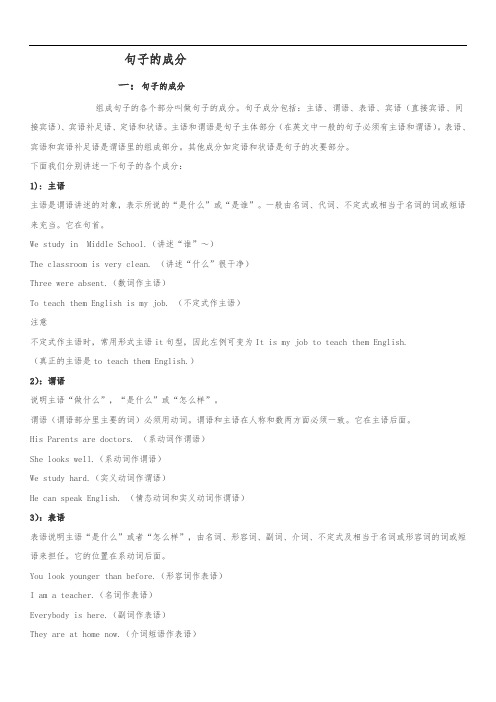
句子的成分一:句子的成分组成句子的各个部分叫做句子的成分。
句子成分包括:主语、谓语、表语、宾语(直接宾语、间接宾语)、宾语补足语、定语和状语。
主语和谓语是句子主体部分(在英文中一般的句子必须有主语和谓语)。
表语、宾语和宾语补足语是谓语里的组成部分。
其他成分如定语和状语是句子的次要部分。
下面我们分别讲述一下句子的各个成分:1): 主语主语是谓语讲述的对象,表示所说的“是什么”或“是谁”。
一般由名词、代词、不定式或相当于名词的词或短语来充当。
它在句首。
We study in Middle School.(讲述“谁”~)The classroom is very clean. (讲述“什么”很干净)Three were absent.(数词作主语)To teach them English is my job. (不定式作主语)注意不定式作主语时,常用形式主语it句型,因此左例可变为It is my job to teach them English.(真正的主语是to teach them English.)2):谓语说明主语“做什么”,“是什么”或“怎么样”。
谓语(谓语部分里主要的词)必须用动词。
谓语和主语在人称和数两方面必须一致。
它在主语后面。
His Parents are doctors. (系动词作谓语)She looks well.(系动词作谓语)We study hard.(实义动词作谓语)He can speak English. (情态动词和实义动词作谓语)3):表语表语说明主语“是什么”或者“怎么样”,由名词、形容词、副词、介词、不定式及相当于名词或形容词的词或短语来担任。
它的位置在系动词后面。
You look younger than before.(形容词作表语)I am a teacher.(名词作表语)Everybody is here.(副词作表语)They are at home now.(介词短语作表语)My job is to teach them English.(不定式作表语)4):宾语宾语是动作、行为的对象,由名词、代词、不定式或相当于名词的词、短语来担任,它和及物动词一起说明主语做什么,在谓语之后。
英语几大句型
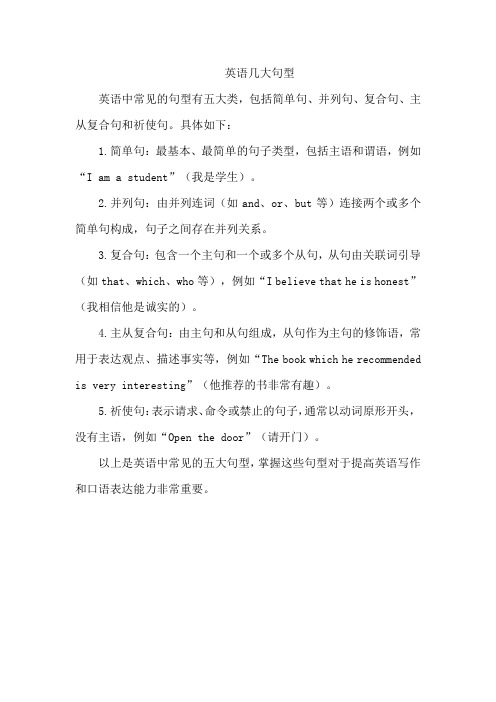
英语几大句型
英语中常见的句型有五大类,包括简单句、并列句、复合句、主从复合句和祈使句。
具体如下:
1.简单句:最基本、最简单的句子类型,包括主语和谓语,例如“I am a student”(我是学生)。
2.并列句:由并列连词(如and、or、but等)连接两个或多个简单句构成,句子之间存在并列关系。
3.复合句:包含一个主句和一个或多个从句,从句由关联词引导(如that、which、who等),例如“I believe that he is honest”(我相信他是诚实的)。
4.主从复合句:由主句和从句组成,从句作为主句的修饰语,常用于表达观点、描述事实等,例如“The book which he recommended is very interesting”(他推荐的书非常有趣)。
5.祈使句:表示请求、命令或禁止的句子,通常以动词原形开头,没有主语,例如“Open the door”(请开门)。
以上是英语中常见的五大句型,掌握这些句型对于提高英语写作和口语表达能力非常重要。
初中英文必背
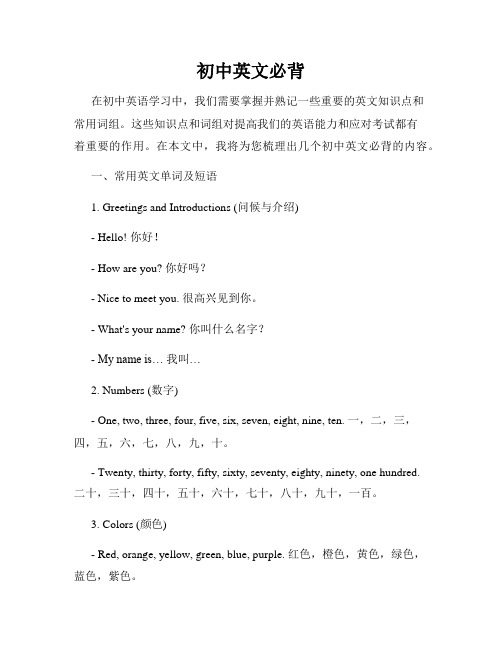
初中英文必背在初中英语学习中,我们需要掌握并熟记一些重要的英文知识点和常用词组。
这些知识点和词组对提高我们的英语能力和应对考试都有着重要的作用。
在本文中,我将为您梳理出几个初中英文必背的内容。
一、常用英文单词及短语1. Greetings and Introductions (问候与介绍)- Hello! 你好!- How are you? 你好吗?- Nice to meet you. 很高兴见到你。
- What's your name? 你叫什么名字?- My name is… 我叫…2. Numbers (数字)- One, two, three, four, five, six, seven, eight, nine, ten. 一,二,三,四,五,六,七,八,九,十。
- Twenty, thirty, forty, fifty, sixty, seventy, eighty, ninety, one hundred.二十,三十,四十,五十,六十,七十,八十,九十,一百。
3. Colors (颜色)- Red, orange, yellow, green, blue, purple. 红色,橙色,黄色,绿色,蓝色,紫色。
- Black, white, gray, brown. 黑色,白色,灰色,棕色。
4. Animals (动物)- Dog, cat, horse, rabbit, bird, fish. 狗,猫,马,兔子,鸟,鱼。
- Monkey, panda, tiger, lion, elephant. 猴子,熊猫,老虎,狮子,大象。
5. Food and Drinks (食物与饮料)- Apple, banana, orange, grapes, strawberry. 苹果,香蕉,橙子,葡萄,草莓。
- Rice, noodles, bread, milk, water. 米饭,面条,面包,牛奶,水。
高中高一生英语必背知识点
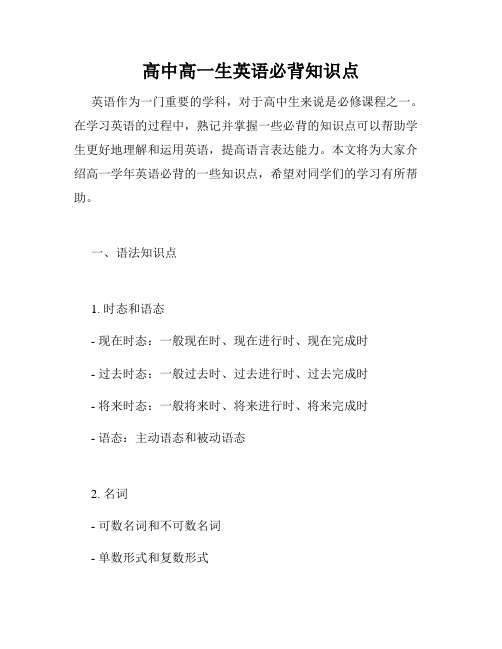
高中高一生英语必背知识点英语作为一门重要的学科,对于高中生来说是必修课程之一。
在学习英语的过程中,熟记并掌握一些必背的知识点可以帮助学生更好地理解和运用英语,提高语言表达能力。
本文将为大家介绍高一学年英语必背的一些知识点,希望对同学们的学习有所帮助。
一、语法知识点1. 时态和语态- 现在时态:一般现在时、现在进行时、现在完成时- 过去时态:一般过去时、过去进行时、过去完成时- 将来时态:一般将来时、将来进行时、将来完成时- 语态:主动语态和被动语态2. 名词- 可数名词和不可数名词- 单数形式和复数形式- 可数名词的限定词和数量词3. 代词- 主格代词和宾格代词- 物主代词和反身代词- 不定代词和指示代词4. 形容词和副词- 形容词的比较级和最高级- 副词的比较级和最高级5. 动词- 不规则动词的基本形式、过去式和过去分词形式- 动词的时态和语态二、词汇知识点1. 常用高频词汇- 动词、名词、形容词、副词等常用词汇- 常见的短语和习惯用语2. 同义词和反义词- 常见的同义词和反义词的对应关系3. 词根、前缀和后缀- 常见的词根、前缀和后缀用法和含义三、句型和篇章结构知识点1. 基本句型- 主谓结构、主谓宾结构、主系表结构等基本句型2. 祈使句和感叹句- 祈使句和感叹句的用法和特点3. 并列句和复合句- 并列句的连接词和标点符号- 复合句的主从句结构和连接词4. 不同篇章结构- 议论文、说明文、记叙文、应用文等不同类型文章的结构和特点四、阅读技巧和写作要点1. 阅读技巧- 快速阅读和细读的区别和方法- 找出文章的主旨和关键信息- 掌握词汇猜测和上下文推测的技巧2. 写作要点- 书信、日记、作文等写作的要求和基本结构- 表达观点、论证和举例的常用句型和技巧总结:以上所列举的知识点属于高中高一英语必背的重要内容,通过熟练掌握这些知识,同学们可以在英语学习中更加得心应手。
除了背诵和记忆这些知识点,还要注重在实际运用中的灵活运用,提高语言表达能力。
雅思写作70个必备句型;句句干货

雅思写作70个必备句型句句干货雅思写作70个必备句型句句干货,帮助大家在一个小时之内写出一手漂亮的作文,合理安排开始时间,熟记下面的必备句型,考试的时候将会有一定的辅助作用,感兴趣的同学赶紧来看看吧!雅思写作70个必备句型详细内容如下:1.It作先行主语和先行宾语的一些句型She had said what it was necessary to say。
2.强调句型It is not who rules us that is important, but how he rules us。
3.“All+抽象名词〞或“抽象名词+itself〞(very+形容词)|He was all gentleness to her。
4.利用词汇重复表示强调A crime is a crime。
5.“something(much)of〞和“nothing(little)of〞“something of〞相当于“to some extent〞,表示程度。
在疑问句或条件从句中,那么为“anything of 〞,可译为“有点〞,“略微等。
〞“译为毫无〞,“全无〞。
“much of〞译为“大有〞,“not much of〞可译为“算不上〞,“称不上〞,“little of〞可译为“几乎无〞。
something like译为“有点像,略似。
〞They say that he had no university education, but he seems to be something of a scholar。
6.同格名词修饰是指of前后的两个名词都指同一个人或物,“of〞以及它前面的名词构一个形容词短语,以修饰“of〞后面的那个名词。
如“her ol d sharper of a father〞,可译为:“她那骗子般的父亲〞。
Those pigs of girls eat so much。
7.as…as…can(may)beIt is as plain as plain can be。
《英语的五种基本句型》
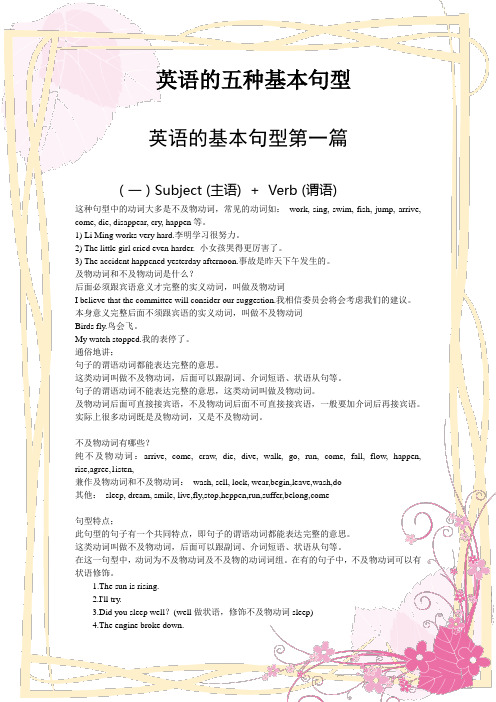
英语的五种基本句型英语的基本句型第一篇(一)Subject (主语) + Verb (谓语)这种句型中的动词大多是不及物动词,常见的动词如:work, sing, swim, fish, jump, arrive, come, die, disappear, cry, happen等。
1) Li Ming works very hard.李明学习很努力。
2) The little girl cried even harder. 小女孩哭得更厉害了。
3) The accident happened yesterday afternoon.事故是昨天下午发生的。
及物动词和不及物动词是什么?后面必须跟宾语意义才完整的实义动词,叫做及物动词I believe that the committee will consider our suggestion.我相信委员会将会考虑我们的建议。
本身意义完整后面不须跟宾语的实义动词,叫做不及物动词Birds fly.鸟会飞。
My watch stopped.我的表停了。
通俗地讲;句子的谓语动词都能表达完整的意思。
这类动词叫做不及物动词,后面可以跟副词、介词短语、状语从句等。
句子的谓语动词不能表达完整的意思,这类动词叫做及物动词。
及物动词后面可直接接宾语,不及物动词后面不可直接接宾语,一般要加介词后再接宾语。
实际上很多动词既是及物动词,又是不及物动词。
不及物动词有哪些?纯不及物动词:arrive, come, craw, die, dive, walk, go, run, come, fall, flow, happen, rise,agree,1isten,兼作及物动词和不及物动词:wash, sell, lock, wear,begin,leave,wash,do其他:sleep, dream, smile, live,fly,stop,heppen,run,suffer,belong,come句型特点;此句型的句子有一个共同特点,即句子的谓语动词都能表达完整的意思。
考研短文写作常用英语重点句型

考研短文写作常用英语重点句型考研短文写作常用英语重点句型“引言”段落中的常用句型:1.…is a very popular topic which is much talked aboutnot only by …but also by …家庭人口多好还是家庭人口少好是一个非常通俗的主题,不但是城里人,而且农民都经常谈论这个问题。
Weahter a large family is a good thing or not is a very popular topic which is often talked about not only by city residents but by farners as well.2.There is no denying the fact that…无可否认,空气污染是一个极其严重的问题:城市*应该采取有力措施来解决它。
There is no denying the fact that air pollution is an extemerely serious problem:the city authorities should take strong measures to deal with it.3.As is known to all,…众所周知,假冒伪劣商品损害了消费者的利益。
As is known to all, fake and inferior commodities harmthe interests of consumers.(=do a lot of harm to theinterests of comsumers)4.More and more people are realizing the importance of …现在越来越多的人理解到法制教育的重要性。
为了维护社会治安,我们每人都应该接受法制教育。
Tody an increasing number of people have realized that law education is of great importance .In order to keep law and order, very one of us is supposed to get(=receive)a law education.5.From what I have mentioned above we can see clearly that…从上面我所提到的,我们能够清楚地看到,电视暴力对青少年的影响是极其长远的。
初中英语补全对话常用句型
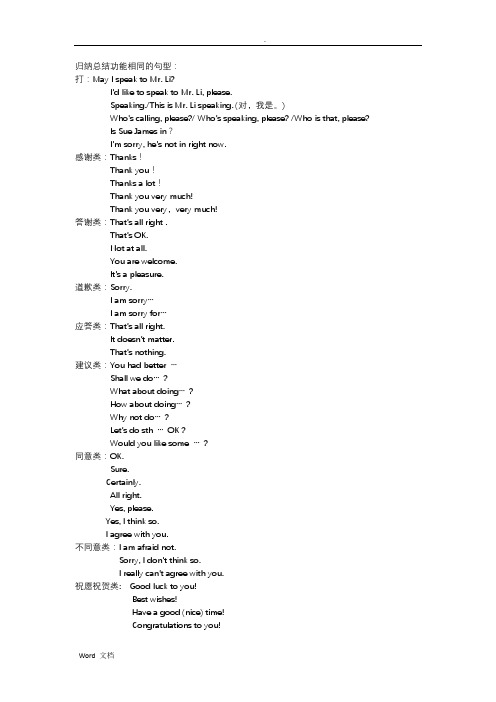
归纳总结功能相同的句型:打:May I speak to Mr. Li?I'd like to speak to Mr. Li, please.Speaking./This is Mr. Li speaking. (对,我是。
)Who's calling, please?/ Who's speaking, please? /Who is that, please?Is Sue James in?I'm sorry, he's not in right now.感谢类:Thanks!Thank you!Thanks a lot!Thank you very much!Thank you very,very much!答谢类:That’s all right .That’s OK.Not at all.You are welcome.It’s a pleasure.道歉类:Sorry.I am sorry…I am sorry for…应答类:That’s all right.It doesn’t matter.That’s nothing.建议类:You had better …Shall we do…?What about doing…?How about doing…?Why not do…?Let’s do sth …OK ?Would you like some …?同意类:OK.Sure.Certainly.All right.Yes, please.Yes, I think so.I agree with you.不同意类:I am afraid not.Sorry, I don’t think so.I really can’t agree with you.祝愿祝贺类: Good luck to you!Best wishes!Have a good (nice) time!Congratulations to you!Happy Teachers’Day!Happy birthday to you!Happy New Year!Merry Christmas!熟记“问”字句型问天气:What’s the weather like today?How is the weather today?问时间:What’s the time?What time is it?问职业:What’s your father?What’s your father’s job?What does your father do?问价格:What’s the price of the book?How much is the book?How much does the book cost?How much should I pay for the book?问年龄:How old are you?What’s your age?问地址:Where do you live?What’s your address?问姓名:What’s your name?Could I have your name, please?Do you mind my knowing your name?Do you mind if I know your name?Can you tell me your name?问词意:What do you mean by saying the word?What’s the meaning of the word?What does the word mean?问单位:Where do you work?What company are you working for?问爱好:Which do you like best?Which do you prefer?What’s your hobby?What’s your favorite?问感受:What do you think of the film?How do you like the film?问数量:How many people are there in your family?How much water do you drink every day? 问人口:What’s the population of China?How many people are there in China?How large is the population of China?问路线:Which is the way to the station?Do you know the way to the station?Can you tell me the way to the station?How can I get to the station?问尺寸:What size is your sweater?What size do you want?What size do you need?问距离:How far is your school from here?How far away is your school from here?问日期:What’s the date today?问星期:What day is it today?问高度:How tall are you?What’s your height?How high is the mountain?问宽度:How wide is the river?问长度:How long is the bridge?问体重:What’s your weight?How much do you weigh?问:Can I know your telephone number?What’s your telephone number?购物:1.Can I help you ? -Yes ,please.2.What color do you want ?\What sizes do you want ?\How many do you want ?3.How much is it ?4. Can I try it on ?\ May I try it on ? -Of course.\ Sure , you can.5.I’ll take it.6.What kind of noodles would you like ? –I’d like beef noodles.7.Thank you . –You ‘re welcome.问路:1.Excuse me? –Yes?2.Can you tell me how to get to …?\Could you please tell me how to…3.Where is …4.How far is it ?5.How long does it take?6.How can I get to …7.Go straight \Go down . Turn right\left8.Can I ride a bike there ?天气:1. What’s the weather like ?\How’s the weather ?2. It’s sunny\rainy\cloudy\windy\snowy…3. Which season do you like best?4. I like Spring \Summer\Autumn\Winter.假期,周末活动:1. How was your weekend?2. what did you do on weekends?3. What are you going to do on weekend ?\What are you going to do for vacation? \where would you go on vacation?4. I am going to ..5. When will you leave ?\When are you going?6. How will you get there?7. How long are you staying?8. When shall we meet?9. Where shall we meet?10. That’s a good idea . \That sounds good .11. What about you ?\How about you?\What about doing…学习:1.How do you study for a test ?\How do you learn English ?2.I study by listening to the tapes .3.What’s your favorite subject ?- My favorite subject is …4.Who is your English teacher ? - She is ...问日期:What’s the date today?When is …?看医生:What’s the matter ?\What ’s wrong ?\What’s the trouble ?I have a cold \I have a headache.When did it start ?How long have you been like this ?试题案例(一)看病A:Good morning.B:Good morning. What’s wrong with you?A:I don’t feel very well and I’ve a headache.B:How long have you been like this?A:Ever since this morning.B:Maybe you’ve caught a cold. Have you taken your temperature?A:No, I haven’t.B:Can I take your temperature?A:OK.B:Oh, you’ve got a fever.A:Is it serious?B:Nothing serious.A:What should I do then?B:You can take some medicine and drink much water.A:How often should I take this medicine?B:You can take this medicine three times a day and you’ll be all right soon. A:Thank you, doctor. I’ll do as you say. Bye!B:Bye!(二)打J-Jim M-Mrs ReadJ:Hello. Could I speak to Ann, please?M:Certainly. Hold on, please. Oh, I’m afraid. She isn’t here right now.J:Can I leave a message for her?M:Yes, please. But who is that?J:This is Jim speaking.M:Hello, Jim. Can I take a message for you?J:Yes. Could you ask her to call me?M:Sure! What’s your telephone number?J:My telephone number is 1234567.M:I’ll give the message to her as soon as she comes back.J:Thank you. Good-bye!M:Bye!(三)购物A:Good morning. Can I help you?B:Yes, please. I want to buy a pair of shoes. Can you show me one?A:What size do you need?B:Size 38.A:How about those ones?B:I don’t like this color. Have you got any other colors?A:Yes. How about this one?B:It looks nice. Can I try them on?A:Sure.B: Oh, it's just right. Where is it made?A: it's made in Japan. it's very comfortable.B: How much are they?A: 100 yuanB: it's too expensive. I cant afford it. Have you got a cheaper one?A: Well. I'm afraid it,'s the cheapest one.B: OK. I'll take it. Here is the money.A: Thank you. good-bye!B: Bye!(四)问路A: Excuse me. Where is the nearest post office, please?B: Sorry, I don’t know. you'd better ask the policeman over there. He may know. A: Thank you all the same.B: Excuse me. Which is the way to the post office, please?C: Go down this street and take the first turning on the right. Go across the bridge and you' ll find the post office on the left. it's between the city library and the hospital. You cant miss it. A: How far is it from here?C it's about 30 minutes' walk. You’d better catch a bus.A: Which bus do I need?C: I think you need a number 16 bus. The bus will take you thereA: Thank you very much.C:You’re welcome(五)约定A: What are you going to do next Sunday?B: Nothing much(Nothing special).A: Shall we go to the park and play football?B: Good idea.A: How can we get there?B: By bikeA: Where shall we meet?B: How about meeting at the gate of our school?A: when shall we meet?B:At 8:30.A: Why not meet a little earlier? let's make it half past seven.B: OKA: See you then.B: See you.(六)询问病情A: Good morning. Xiao XueB: Good morning. Lin LinA: I don;t see Zhou Tao today. Do you know where he is?B: Yes. He is in hospital.A: what's wrong with him?B: Yesterday evening he felt terrible. He had a pain in his teeth and his father took him to the hospital.A: What happened to him then?B: One of his teeth is broken. The doctor took it out.A: I’m sorry to hear that. He always eats a lot of sweets.B: Yes. But he wont eat them any more.A How is Zhou Tao feeling now?B I don't know let's visit him after school. OK?A:OK.(7)聊天A: Hello! Nice to meet youB: Nice to meet you,tooA: What bad weather. isnt it?B: Yes but I think the sun will come out later on.A: May I ask you some questions?B: Certainly.A: Where are you from?B: I’m from……A: You're from Australia, aren’t you?B: Yes. How did you guess?A: The way you speak. When were you born?B: I was born on August 8, 1988.A: Where were you born?B: I was born in a small village near London.A: Why did you come to China?B: Because my parents wanted to work in China.A: How do you like China?B: I like it very much.A: What do you like about China?B: The people and the food.A: How is your Chinese?B: My Chinese is just so-so.I'm trying my best to study my Chinese well. A: That’s great. Good luck with your Chinese.(八)就餐Waiter: Good morning, madamA and B: Good morning.W: A table for two?A: Yes. Can we sit at the table by the window?W: OK. This way, please. Here is the menu.A: Thank you.W: May I take your order now?A: Yes, we'll have chicken with potatoes, beef rice and vegetable soup. W: That’s what you ordered. please take your time.(After the meal)A: Excuse me, Could we have some tea, please?W: certainly. Would you like something else?A: No. That’s all. Could we have the bill?W: Of course. SirA: Here is the moneyW: Thank you. Welcome you here again.(九)做客H-Han Mei t-twins l-lilyH: Would you like a drink?H: I'll get you some tea.T: Can we do anything to help?H: No, thanks. Here are some cookies. Help yourselves.T: Thank you.L: Well. I think it's time for us to leave now?H: Oh, do you have to?L: Yes, I'm afraid so. it's getting late and we have to get up early in the morning.H: Don’t leave anything behind.L: Thanks. I think we have everything. Thank you for having us. We enjoyed ourselves very much.H: I'm happy you did. Bye!(十)交通事故A: Excuse me. What has happened?B: A car hit an electric pole.A: When did it happen?B About ten minutes ago.A: Has anyone called the police?B: Yes, but the police haven’t come.A: Is anyone hurt?B: Yes, a man is hurt, but not badly.A: Has he gone to the hospital?B: No, he is waiting for the police to come. After the survey he will go to the hospital.试题精选(1)Doctor: Good morning. what's your trouble?Woman: I don't feel very well.D:1 ?W: Yes, I have. My temperature is a little higher.D: Open your mouth and say“Ah”.W: AahhD:2 ?W: Ever since last night.D: Did your sleep well?W: No, I was very tired last night.D: Oh. I see. 3 .W: Can you tell me how I got a cold?D: Maybe you overworked yourself.W: I think so. I have too much work to do every day.Do i have to stay at home?D: Yes. you'd better stay at home for two or three days.W:4. ?D: No. I don't think it is serious. But you really needa good rest and take this medicineW:5. ?D: Three times a dayW: OK. Thank you.(2)A:1 ?B: They are talking about yesterday's football match.A: Oh, I watched it on TV. Beijing Team had very good teamwork. didn't you watch it?B:2 .I did my homework and forgot the time. When I turned on the TV, it had finished already.A:3 !But Beijing Team will play again this eveningB:4. ?A: Sure. you'd better finish your homework earlier if you want to watch it. Remember, "5 .”(3)B: That’s a good idea. (Looking at his watch. )Oh, I haven’t much time left. I'd better hurry to finish my homework.A:1. ?B: Not yet Exercise 3 is too difficult for meA: Don’t worry. 2 .B: it's very kind of you. But I think I can do it myself. Can you lend me your English-Chinese dictionary?A: With pleasure. 3 .B: Thanks. 4 ,is miss Gao at the teachers' office?A: Oh no. she's out at the moment.B:5 ?Do you know? I have some questions to ask her.A: I think she is at the library. She told me she wanted to borrow some books.B: I have to wait for her.(4)Dick: Excuse me, Lucy. Have you g bot a dictionary?Lucy: Sorry, I haven’t You may ask Meimei. 1. .Dick: Excuse me, Meimei. Have you got a dictionary?Meimei: Yes. 2 .Dick: Thank you. I'll give it back soon. by the way, tomorrow is my birthday.3 ?Meimei: Yes. I’d love to. 4 ?Dick :About seven o'clock.Meimei: I'll try to be there on time, but 5. .Dick: It doesn't matter. Work must come first.(5)(Sue=s Ken=k)S: Hello, Ken! Could you give me a lift?K:1. I don’t have a car right now.S: Oh, that’s too bad! I want to go to the Central Hospital.K: Why? 2 ?S: No, I'm all right. My English teacher is there. She is ill now and is to leave the hospital today.K: I see. 3 ?S: I've already got some flowers from my mother's garden.K: Well well. 4 .S: But, what a pity! I cant see Linda now. No car and no driver.K: Wrong. You have a good driver here. 5 .S: Really? that's great. it's very kind of you, Ken.K:It’s my pleasure.。
英语的5种基本句型结构
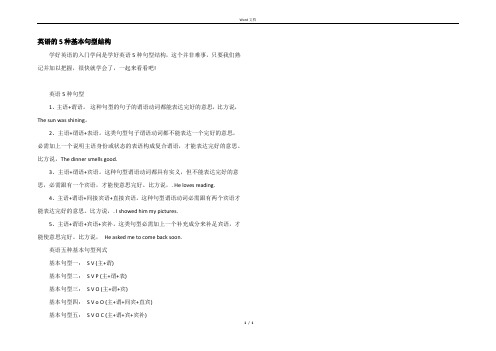
Word文档英语的5种基本句型结构
学好英语的入门学问是学好英语5种句型结构,这个并非难事,只要我们熟
记并加以把握,很快就学会了,一起来看看吧!
英语5种句型
1、主语+谓语。
这种句型的句子的谓语动词都能表达完好的意思,比方说,
The sun was shining。
2、主语+谓语+表语。
这类句型句子谓语动词都不能表达一个完好的意思,
必需加上一个说明主语身份或状态的表语构成复合谓语,才能表达完好的意思。
比方说,The dinner smells good.
3、主语+谓语+宾语。
这种句型谓语动词都具有实义,但不能表达完好的意
思,必需跟有一个宾语,才能使意思完好。
比方说,. He loves reading.
4、主语+谓语+间接宾语+直接宾语。
这种句型谓语动词必需跟有两个宾语才
能表达完好的意思。
比方说,. I showed him my pictures.
5、主语+谓语+宾语+宾补。
这类句型必需加上一个补充成分来补足宾语,才
能使意思完好。
比方说,He asked me to come back soon.
英语五种基本句型列式
基本句型一:S V (主+谓)
基本句型二:S V P (主+谓+表)
基本句型三:S V O (主+谓+宾)
基本句型四:S V o O (主+谓+间宾+直宾)
基本句型五:S V O C (主+谓+宾+宾补)
1/ 1。
中考英语必背therebe句型
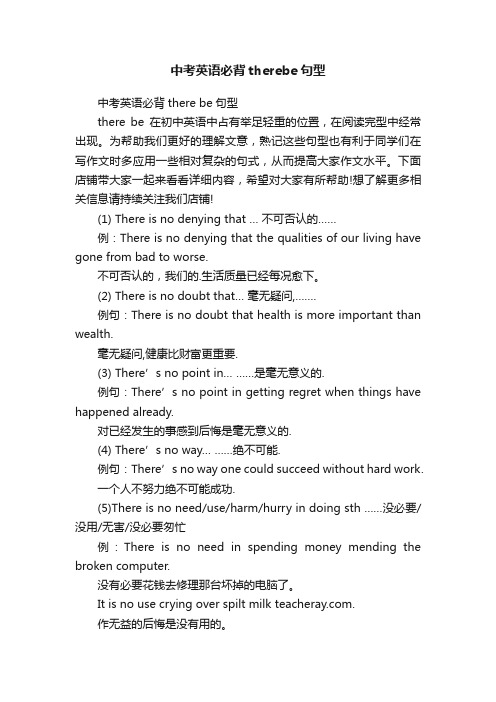
中考英语必背therebe句型中考英语必背there be句型there be在初中英语中占有举足轻重的位置,在阅读完型中经常出现。
为帮助我们更好的理解文意,熟记这些句型也有利于同学们在写作文时多应用一些相对复杂的句式,从而提高大家作文水平。
下面店铺带大家一起来看看详细内容,希望对大家有所帮助!想了解更多相关信息请持续关注我们店铺!(1) There is no denying that … 不可否认的……例:There is no denying that the qualities of our living have gone from bad to worse.不可否认的,我们的.生活质量已经每况愈下。
(2) There is no doubt that… 毫无疑问,…….例句:There is no doubt that health is more important than wealth.毫无疑问,健康比财富更重要.(3) There’s no point in… ……是毫无意义的.例句:There’s no point in getting regret when things have happened already.对已经发生的事感到后悔是毫无意义的.(4) There’s no way… ……绝不可能.例句:There’s no way one could succeed without hard work.一个人不努力绝不可能成功.(5)There is no need/use/har m/hurry in doing sth ……没必要/没用/无害/没必要匆忙例:There is no need in spending money mending the broken computer.没有必要花钱去修理那台坏掉的电脑了。
It is no use crying over spilt milk .作无益的后悔是没有用的。
高中英语必考动词短语及100 条重点句型,建议熟记!
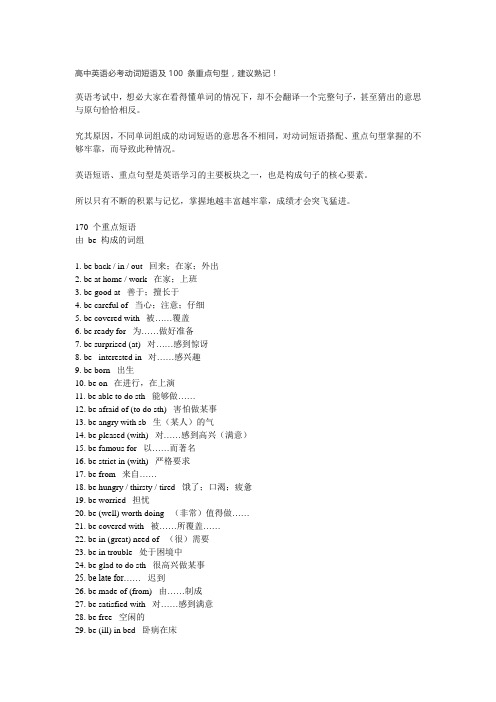
高中英语必考动词短语及100 条重点句型,建议熟记!英语考试中,想必大家在看得懂单词的情况下,却不会翻译一个完整句子,甚至猜出的意思与原句恰恰相反。
究其原因,不同单词组成的动词短语的意思各不相同,对动词短语搭配、重点句型掌握的不够牢靠,而导致此种情况。
英语短语、重点句型是英语学习的主要板块之一,也是构成句子的核心要素。
所以只有不断的积累与记忆,掌握地越丰富越牢靠,成绩才会突飞猛进。
170 个重点短语由be 构成的词组1. be back / in / out 回来;在家;外出2. be at home / work 在家;上班3. be good at 善于;擅长于4. be careful of 当心;注意;仔细5. be covered with 被……覆盖6. be ready for 为……做好准备7. be surprised (at) 对……感到惊讶8. be interested in 对……感兴趣9. be born 出生10. be on 在进行,在上演11. be able to do sth 能够做……12. be afraid of (to do sth) 害怕做某事13. be angry with sb 生(某人)的气14. be pleased (with) 对……感到高兴(满意)15. be famous for 以……而著名16. be strict in (with) 严格要求17. be from 来自……18. be hungry / thirsty / tired 饿了;口渴;疲惫19. be worried 担忧20. be (well) worth doing (非常)值得做……21. be covered with 被……所覆盖……22. be in (great) need of (很)需要23. be in trouble 处于困境中24. be glad to do sth 很高兴做某事25. be late for…… 迟到26. be made of (from) 由……制成27. be satisfied with 对……感到满意28. be free 空闲的29. be (ill) in bed 卧病在床30. be busy doing (with) 忙于做某事由come 构成的词组come back 回来come down 下来come in 进入;进来come on 快;走吧;跟我来come out 出来come out of 从……出来come up 上来come from 来自……由do 构成的词组do one's lessons / homework 做功课do more speaking / reading 多做口头练习;朗读do one's best 尽最大的努力做某事do some shopping (cooking reading, cleaning) 买东西(做饭菜;读点书;大扫除)do a good deed (good deeds) 做好事do morning exercises 做早操do eye exercises 做眼保健操由give 构成的词组give… sth advice on 给……一些忠告give lessons to 给……上课give in 屈服give up 放弃give sb a chance 给……一次机会give a message to 给……一个口信由go 构成的词组go ahead 先走;向前走do to the cinema 看电影go to bed 睡觉(make the bed 整理床铺)go to school (college) 上学go to (the) hospital 去医院看病go over 复习go round 顺便去,绕道走go up 上去go out for a walk 外出散步go on (doing) 继续做某事go on with one's work 继续某人的工作go upstairs / downstairs 上、下楼由have 构成的词组have a lesson (lessons) / a meeting 上课;开会have a football match (basketball match) 举行一场足球、篮球赛have dictation 听见have a try 试一试have a good / wonderful time 玩得很开心have a lecture ( a piano concert ) 听讲座have a report ( talk ) on 听一个关于……的报告have a glass of water ( a cup of tea ) 喝一杯水have breakfast / lunch / supper 吃早饭;午饭;晚饭have a meal ( three meals ) 吃一顿饭11. have a dinner 吃正餐12. have bread and milk for breakfast 早饭吃面包和牛奶13. have a headache 头痛14. have a fever 发烧15. have a cough 咳嗽16. have a look 看一看17. have a rest ( a break ) 休息一会18. have a talk 谈话19. have a swim / walk 游泳;散步20. have sports 进行体育锻炼21. have a sports meet (meeting) 开运动会22. have something done 请人做某事23. have a test / an exam 测试;考验25. have an idea 有了个主意26. had better do sth 最好做某事27. have a word with 与……谈几句话由help, keep 引导的词组help sb with sth / help sb do sth 在……方面帮助;帮助某人做某事help oneself to some chicken / fish / meat 请随便吃help each other 互相帮助keep up with 跟上……keep silent / quite 保持沉默keep sb doing sth 使……一直做……keep one's diary 记日记由make 引导的词组make a noise 制造噪音make a living 谋生make sb do sth 迫使某人做……make faces 做鬼脸make friends 与……交朋友make a mistake 犯错误make room / space for 给……腾出地方make a sentence with 用……造句make a fire 生火由be、make 引导的词组be made from / of 由……制成be made in 在……地方制造look out of (outside) 往外看look up a word (in the dictionary) 查字典look up 往上看look after 照管;照看;照顾look for 寻找look like 看上去像look fine / well / tired / worried 看起来气色好;健康;疲劳;忧郁look out 当心look on…as… 把……当作……来看待look around 朝四周看look at 看着……由put 引导的词组put on 穿上put up 建造;搭起,挂起,举起,张贴put into 使进入,输入put one's heart into 全神贯注于……put…down… 把……放下put…into… 把……译成由set、send 引导的词组set up 竖起,建起set off 出发,动身set out 出发set an example for 为……树立榜样send for 派人去请sent out 放出,发出sent up 发射由take 引导的词组take one's advice 听从某人劝告take out 拿出;取出take down 拿下take place 发生take one's place 代替某人的职务take the place of 代替……take a walk / rest 散步;休息take it easy 别紧张take sth with sb 随身携带take sb to a park 带某人去公园11. take care of 关心;照顾;保管12. take a look at 看一看13. take an exam 参加考试14. take away 拿走15. take back 收回,带回16. take hold of 抓住……17. take off 脱下18. take part in 积极参加活动19. take photos 拍照20. take some medicine 服药21. take a bus 乘车由turn、play 引导的词组turn on 开灯turn off 关灯turn in 交出;上交turn into 变成turn to 翻到;转向turn down 把音量调低turn over 把……翻过来play basketball 打篮球play games 做游戏play the piano 弹钢琴play with snow 玩雪play a joke on 对……开玩笑由其他动词构成的词组think over 仔细考虑arrive at / in a place 达到某处eat up 吃完;吃光do well in 在……做得好enjoy doing sth / like doing sth 喜欢做某事find out 发现,查出finish off 吃完,喝完stop doing sth 停止做某事stop to do sth 停下来去做某事hold a meeting 举行会议hold up 举起hurry up 赶快,快点enter for 报名参加laugh at 嘲笑be used to 习惯于used to 过去常常wake up 唤醒work out 算出① put down 放下/ shut down 把…关上/ cut down 砍掉/ come down下来/ 落下slow down 减缓、放慢/ sit down坐下/ write down写下/ get down 下来,降落②after all 毕竟.终究/ after that 于是、然后/ day after day 日复一日地/ one after another 相继、挨次/ soon after 不久以后/ the day after tomorrow 后天/ name after 根据……命名/ run after 追赶③ come up with找到、提出、赶上/ catch/keep up with赶上/ wake up 弄醒、醒来/ send up 发射/ open up 开设、开办/ grow up长大/ pick up拾起、捡起/ hands up举手/ eat up 吃光/ clean up打扫干净/ give up doing sth.=stop doing sth. 放弃做某事④arrive at/in + n. (地方)=get to +n. (地方)=reach + n. (地方)=arrive / get +adv. (地方)⑤get…back 退还,送回去.取回/ give back 归还/ come back 回来/ at the back of 在…的后面/ on the way (back)home 在回家路上100 句重点句型1. welcome to sp 欢迎到某地Eg. Welcome to China.2. What's the matter with sb. / sth? 出什么毛病了?Eg. What's the matter with your watch?3. be different from 与......不同Eg. The weather in Beijing is different from that of Nanjing.4. be the same as 与……相同Eg. His trousers are the same as mine.5. be friendly to sb. 对某人友好Eg. Mr. Wang is very friendly to us.6. want to do sth. 想做某事Eg. I want to go to school.7. want sb. to do sth. 想让某人做某事Eg. I want my son to go to school.8. what to do 做什么Eg. We don't know what to do next.9. let sb. do sth. 让某人做某事Eg. Let him enter the room.10. let sb. not do sth. 让某人不做某人Eg. Let him not stand in the rain.11. why don't you do sth?怎么不做某事呢?Eg. Why don't you play football with us?12. why not do sth.? 怎么不做某事呢?Eg. Why not play football with us?13. make sb. sth. 为某人制造某物Eg. My father made me a kite.14. make sth for sb. 为某人制造某物Eg. My father made a kite for me.15. What …mean by …? 做……是什么意思?Eg. What do you mean by doing that?16. like doing sth. 喜欢做某事Eg. Jim likes swimming.17. like to do sth. 喜欢做某事Eg. He doesn't like to swim now.18. feel like doing sth. 想做某事Eg. I feel like eating bananas.19. would like to do sth. 愿意做某事Eg. Would you like to go rowing with me?20. would like sb. to do sth. 愿意某人做某事Eg. I’d like you to stay with me tonight.21. make sb. do sth. 使某人做某事Eg. His brother often makes him stay in the sun.22. let sb. do sth. 让某人做某事Eg. Let me sing a song for you.23. have sb. do sth. 使某人做某事Eg. You shouldn't have the students work so hard.24. be far from sp 离某地远Eg. His school is far from his home.25. be near to sp 离某地近Eg. The hospital is near to the post office.26. be good at sth. / doing sth. 擅长某事/做某事Eg.They are good at boating.27. It takes sb. some time to do sth. 某人花多少时间做某事Eg. It took me more than a year to learn to draw a beautiful horse in five minutes.28. sb. spends some time / money (in) doing sth. 某人花多少时间做某事Eg. I spent twenty years in writing the novel.29. sb. spends some time / money on sth. 某事花了某人多少时间/金钱Eg. Jim spent 1000 yuan on the bike.30. sth. costs sb. some money. 某物花了某人多少钱Eg. The bike cost Jim 1000 yuan.31. sb. pays some money for sth. 某人为某物付了多少钱Eg. Jim paid 1000 yuan for the bike.32. begin / start with sth. 开始做某事Eg. The started the meeting with a song.33. be going to do sth. 打算做某事Eg. We are going to study in Japan.34. call A B 叫A BEg. They called the village Gumtree.35. thank sb. for sth./doing sth. 感谢某人做某事Eg. Thank you for your help.36. What ……for? 为什么Eg. What do you learn English for?37. How/ what about doing sth.?做某事怎么样?Eg. How about going fishing?38. Sb +be+ the+最高级+of/in短语Eg. Lucy is the tallest in her class.39. Sb + be +比较级+than any other + n.Eg. Lucy is taller than any other student in her class.40. have to do sth. 不得不做某事Eg. I have to go home now.41. had better do sth. 最好做某事Eg. You'd better study hard at English.42. had better not do sth. 最好别做某事Eg. You'd better not stay up.43. help sb. to do sth. 帮助某人做某事Eg. Lucy often helps Lily to wash her clothes.44. help sb. do sth. 帮助某人做某事Eg. He usually helps me learn English.45. help sb. with sth. 帮助某人做某事Eg. I sometimes help my mother with46. the housework make it +时间把时间定在几点Eg. Let's make it 8:30.47. take sb. to sp 带某人到某地Eg. Mr. Wang will take us to the Summer Palace next Sunday.49. have nothing to do (with sb) 与某人没有关系Eg. That has nothing to do with me.50. 主语+ don't think + 从句认为……不……Eg. I don't think it will rain tomorrow.51. It's + adj.+ for sb. to do sth. 做某事对某人来说怎么样Eg. It is lucky for you to go to London.52. How + adj / adv + 主+ 谓!多么……啊!Eg. How beautiful the flower is!53. what + a / an + adj + n + 主+ 谓!Eg. What an beautiful flower it is!54. What + adj+ pl. / [u] +主+ 谓!Eg. What bad weather it is today!55. find it + adj+ to do sth. 发现做某事如何Eg. I find it hard to speak English well!56. ask sb. for sth. 向某人要某物Eg. They often ask me for money.57. need to do sth. 需要做某事Eg. You need to study hard.58. need sth 需要某物Eg. I don't need your money.59. use A to do B 用A来做BEg. We use pens to write.60. show sb. sth 给某人看某物Eg. Please show me the map.61. show sth. to sb. 把某物给某人看Eg. Please show the map to me.62. pass sb. sth. 把某物递给某人Eg. Pass me the cup of tea.63. pass sth. to sb. 把某物递给某人Eg. Pass the cup of tea to me.64. buy sb. sth. 为某人买某物Eg. Mother bought me a bike.65. buy sth. for sb. 为某人买某物Eg. Mother bought a bike for me.66. give sb. sth 把某物给某人Eg. Jim gave me an English dictionary.67. give sth. to sb. 把某物给某人Eg. Jim gave an English dictionary to me.68. get to sp 达到某地Eg. I got to Beijing on the morning of May 1st.69. arrive at / in sp 达到某地Eg. I arrived in Beijing on the morning of May 1st.70. reach sp 到达某地Eg. I reached Beijing on the morning of May 1st.71. hope to do sth. 希望某人做某事Eg. I hope to see you soon.72. there is sth. wrong with sth. / sb. 某物/ 某人出什么状况了Eg. There is something wrong my car.73. sth. is wrong with … 某物出什么毛病了Eg. Something is wrong with my car.74. How do you like sth? 你认为……怎么样?Eg. How do you like Beijing?75.What do you think of sth.? 你认为……怎么样?Eg. What do you think of Beijing?76. start doing sth. 开始做某事Eg. I started learning English in 1983.77. start to do sth. 开始做某事Eg. I started to watch TV after finishing my homework.78.finish doing sth. 完成作某事Eg. I finished cleaning my car just now.79. enjoy doing sth. 喜欢做某事Eg. They all enjoy living and working in China.80.What / when / where / who / something / anything / nothing else …… 别的什么/何时/何地/谁……①What else do you want to buy?②Where else have you gone?③Who else have you played with?④I have nothing else to tell you.⑤Would you like something else?81. forget doing sth. 忘记做过某事了(已做)Eg. I forgot turning off the lights. Look, it is dark in the room.82. forget to do sth. 忘了做某事了(未做)Eg. I forgot to turn off the lights. Could you go back and shut the off?83. remember doing sth. 记得做过某事了(已做)Eg. I remembered returning your money. You are so forgetful.84. remember to do sth. 记住去做某事(未做)Eg. Remember to bring me some money. I've run out of it.85.stop to do sth. 停下来去做某事Eg. He stopped to talk with Mary when she enter the office.86. stop doing sth. 停止做某事Eg. The students stopped talking when the teachet came in.87. watch / see / hear sb. do sth. 观看/看见/听见某人做了某事(全过程)Eg. I saw you pick an apple just now.88. watch / see / hear sb. doing sth. 观看/看见/听见某人正在做某事(点动作)Eg. I saw you playing basketball with your classmates on the playground last Sunday.89. go on doing sth. 继续作某事Eg. He went on reading after a short rest.90. go on to do sth. 继续作某事Eg. He went on to read after finishing wash the dishes.91. go on with sth. 继续某事Eg. He went on with his work after a short rest.92. say hello / goodbye to sb. 向某人告别Eg.I came to say good-bye to you.93. be busy doing sth. 忙于做某事Eg. They are busy planting trees on the hill.94. be interested in sth. 对某事感兴趣Eg. English is very interesting. We are all interested in it.95. tell sb. to do sth. 告诉某人做某事Eg. Mother told me to go shopping with her.96. ask sb. to do sth. 让某人做某事Eg. Jim ask me to go rowing with him.97. call / ring sb. up 给某人打电话Eg. I will call you up tommow.98. be ready to do sth. 准备做某事Eg. We are ready to have lunch.99. go doing sth. 去做某事Eg. Let's go fishing.100. prefer A / doing A to B / doing B 比起A / 做A,更喜欢B / 做BEg. Lucy prefers English to French. I prefer staying at home to going to the cinema。
常用英语口语8000句:表达“问候”的11种句型
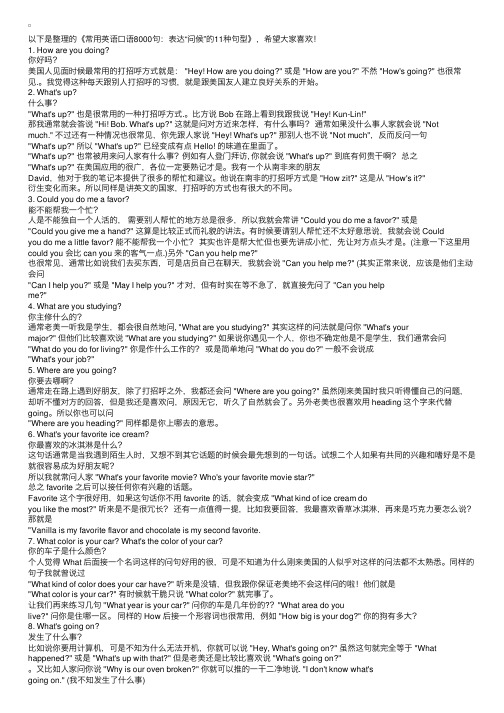
以下是整理的《常⽤英语⼝语8000句:表达“问候”的11种句型》,希望⼤家喜欢!1. How are you doing?你好吗?美国⼈见⾯时候最常⽤的打招呼⽅式就是: "Hey! How are you doing?" 或是 "How are you?" 不然 "How's going?" 也很常见.。
我觉得这种每天跟别⼈打招呼的习惯,就是跟美国友⼈建⽴良好关系的开始。
2. What's up?什么事?"What's up?" 也是很常⽤的⼀种打招呼⽅式.。
⽐⽅说 Bob 在路上看到我跟我说 "Hey! Kun-Lin!"那我通常就会答说 "Hi! Bob. What's up?" 这就是问对⽅近来怎样,有什么事吗?通常如果没什么事⼈家就会说 "Not much." 不过还有⼀种情况也很常见,你先跟⼈家说 "Hey! What's up?" 那别⼈也不说 "Not much",反⽽反问⼀句"What's up?" 所以 "What's up?" 已经变成有点 Hello! 的味道在⾥⾯了。
"What's up?" 也常被⽤来问⼈家有什么事?例如有⼈登门拜访, 你就会说 "What's up?" 到底有何贵⼲啊?总之"What's up?" 在美国应⽤的很⼴,各位⼀定要熟记才是。
我有⼀个从南⾮来的朋友David,他对于我的笔记本提供了很多的帮忙和建议。
他说在南⾮的打招呼⽅式是 "How zit?" 这是从 "How's it?"衍⽣变化⽽来。
英语作文高级句型

7.It was getting dark. And it began to rain.(插入语)
It was getting dark. What was worse, it began to rain.
3.使用with的复合结构。如: With the noise going on,I couldn’t go on studying.由于那噪音的持续,我无法继续 学习。 4.使用非谓语动词。如: Located at the southwest corner of our school,the botanical garden has an area of 1000 square metres.校园西南角,面积1000 平方米。
2.使用倒装句。如:
Only in this way can we learn English well. 只有用这种方法我们才可以学好英语。 Before everything else, getting ready is the secret of success. 做好准备是成功的首要 秘诀。
简单句其实也可以不简单,若将简单 句与非谓语动词短语、形容词短语、介词 短语、同位语、独立主格结构等巧妙地合 并在一起,不但可以表达更丰富的内容, 而且也使句子变得更精彩,充分显示你在 英语表达上的实力。以下各句摘自近年各 省市高考写作范文的高级简单句,请欣赏、 熟记、模仿:
1.同位语: I want to have a pen friend, hopefully a girl in her early twenties and with interests similar to mine.我 想有一个笔友,希望是一个二十出头 且兴趣相投的女孩子。(同位语中又有 两个并列的介词短语修饰)(全国)
英语作文万能句子
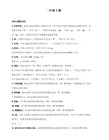
go out of go back to go home go along make friends make one’s bed
How+adj+主语+bel What+a/an+adj+名词(单)! Too+形容词/副词+to do sth
二、掌握以下词组
be good at be late for be worried about be interested in be busy dong sth
4、助动词+行为动词be+ving do not/does not/did not/+v have/has/had+过去分词 be+过去分词(被动语态) will/would/be going to+v原
五、真正理解五种简单名结构
1、主语+不及物动词
2、主语+及物动词+宾语
turn on/off/up/down learn from sb do well in take away take sb to sp
take sth with sb take one’s temperature take off give up doing pick up
第1页 英语作文万能句子(1)
第2页 句子
一、熟记以下句型
want to do sth help sb with sth Help sb do sth ask sb to do sth
高中英语语法五大基本句型
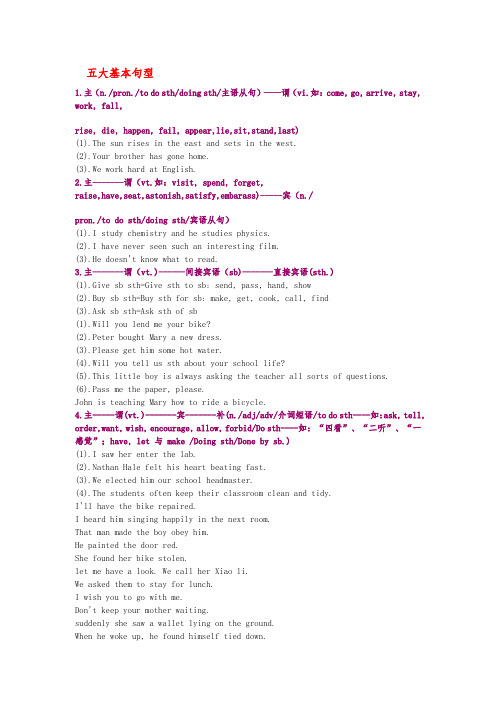
五大基本句型1.主(n./pron./to do sth/doing sth/主语从句)——谓(vi.如:come, go, arrive, stay, work, fall,rise, die, happen, fail, appear,lie,sit,stand,last)(1).The sun rises in the east and sets in the west.(2).Your brother has gone home.(3).We work hard at English.2.主-------谓(vt.如:visit, spend, forget,raise,have,seat,astonish,satisfy,embarass)-----宾(n./pron./to do sth/doing sth/宾语从句)(1).I study chemistry and he studies physics.(2).I have never seen such an interesting film.(3).He doesn't know what to read.3.主-------谓(vt.)------间接宾语(sb)-------直接宾语(sth.)(1).Give sb sth=Give sth to sb: send, pass, hand, show(2).Buy sb sth=Buy sth for sb: make, get, cook, call, find(3).Ask sb sth=Ask sth of sb(1).Will you lend me your bike?(2).Peter bought Mary a new dress.(3).Please get him some hot water.(4).Will you tell us sth about your school life?(5).This little boy is always asking the teacher all sorts of questions.(6).Pass me the paper, please.John is teaching Mary how to ride a bicycle.4.主-----谓(vt.)-------宾-------补(n./adj/adv/介词短语/to do sth----如:ask, tell, order,want, wish, encourage, allow, forbid/Do sth----如:“四看”、“二听”、“一感觉”;have, let 与 make /Doing sth/Done by sb.)(1).I saw her enter the lab.(2).Nathan Hale felt his heart beating fast.(3).We elected him our school headmaster.(4).The students often keep their classroom clean and tidy.I'll have the bike repaired.I heard him singing happily in the next room.That man made the boy obey him.He painted the door red.She found her bike stolen.let me have a look. We call her Xiao li.We asked them to stay for lunch.I wish you to go with me.Don't keep your mother waiting.suddenly she saw a wallet lying on the ground.When he woke up, he found himself tied down.5.主-----系(be/look,smell,taste,sound,feel/prove,remain,stay,keep/turn,get,become,make)----表。
中考英语写作题常见基本句型
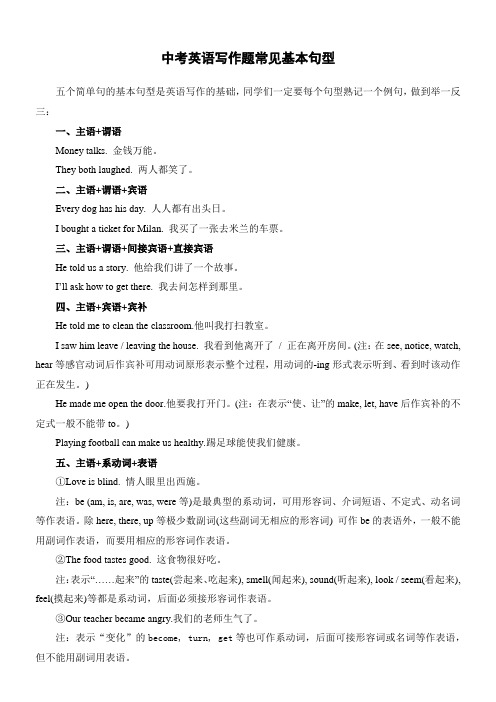
中考英语写作题常见基本句型五个简单句的基本句型是英语写作的基础,同学们一定要每个句型熟记一个例句,做到举一反三:一、主语+谓语Money talks. 金钱万能。
They both laughed. 两人都笑了。
二、主语+谓语+宾语Every dog has his day. 人人都有出头日。
I bought a ticket for Milan. 我买了一张去米兰的车票。
三、主语+谓语+间接宾语+直接宾语He told us a story. 他给我们讲了一个故事。
I’ll ask h ow to get there. 我去问怎样到那里。
四、主语+宾语+宾补He told me to clean the classroom.他叫我打扫教室。
I saw him leave / leaving the house. 我看到他离开了/ 正在离开房间。
(注:在see, notice, watch, hear等感官动词后作宾补可用动词原形表示整个过程,用动词的-ing形式表示听到、看到时该动作正在发生。
)He made me open the door.他要我打开门。
(注:在表示“使、让”的make, let, have后作宾补的不定式一般不能带to。
)Playing football can make us healthy.踢足球能使我们健康。
五、主语+系动词+表语①Love is blind. 情人眼里出西施。
注:be (am, is, are, was, were等)是最典型的系动词,可用形容词、介词短语、不定式、动名词等作表语。
除here, there, up等极少数副词(这些副词无相应的形容词) 可作be的表语外,一般不能用副词作表语,而要用相应的形容词作表语。
②The food tastes good. 这食物很好吃。
注:表示“……起来”的taste(尝起来、吃起来), smell(闻起来), sound(听起来), look / seem(看起来), feel(摸起来)等都是系动词,后面必须接形容词作表语。
- 1、下载文档前请自行甄别文档内容的完整性,平台不提供额外的编辑、内容补充、找答案等附加服务。
- 2、"仅部分预览"的文档,不可在线预览部分如存在完整性等问题,可反馈申请退款(可完整预览的文档不适用该条件!)。
- 3、如文档侵犯您的权益,请联系客服反馈,我们会尽快为您处理(人工客服工作时间:9:00-18:30)。
What a fine picture it is!多美的一幅图画呀!
句型7:Thank+sb. +for(doing)sth.
Thank you for coming to see me. 感谢你来看我。
句型8:So+be/ 情态动词/ 助动词+主语
He is a student. So am I. 他是一个学生,我也是。
句型11:the +比较级,the +比较级
The more one has,the more one wants. 越有越贪。
句型12:... as +adj./ adv.+as ...
…not as(so) +adj. / adv. +as ...
Do you think that art is as important as music?你认为艺术和音乐一样重要吗?Last Sunday the weather was not so wet as it is today. 上个星期天的天气不如今天的天气潮湿。
句型3:How do you like...?
How do you like China?你觉得中国怎么样?
句型4:What do you like about...?
What do you like about China?你喜欢中国的什么?
句型5:had better(not)+动词原形
句型15:both ... and ...
Both you and I are students. 我和你都是学生。
句型16:either ... or...
Either you or he is wrong . 不是你错就是他错。
句型17:neither ... nor ...
句型23:Welcome(back)to...
Welcome back to school!欢迎回到学校!
句型24:have fun doing
We’re going to have fun learning and speaking English this term. 这学期我们将兴味盎然地学习. 我和他都不是学生。
句型18:... as soon as ...
As soon as I see him,I’ll give him the message. 我一见到他,我就把你的消息告诉他。
句型19:... so+adj. / adv.+that ...
I was so tired that I didn’t want to speak. 我累得连话也不想说了
句型20:Though...+主句
Though I like writing to my pen-friend,it takes a lot of time. 虽然我喜欢给笔友写信,但它要耗费我大量时间。
句型25:... because ... / ...,so ...
I don’t know all your names because this is our first lesson. 因为这是我们的第一节课,所以我并不知道你们所有人的名字。
句型26:Why don’t you ... / Why not ...
You’d better ask that policeman over there. 你最好去问问那边的那个警察。
句型6:
How+adj. / adv. +主语+谓语!
What a/ an+adj. +n. +主语+谓语!
How cold it is today !今天多冷啊!
句型13:more/ less +adj.+than...
I think art is less important than music. 我认为艺术不如音乐重要。
句型14:stop…from doing sth.
The Great Green Wall will stop the wind from blowing the earth away. 绿色长城将阻挡风吹走土壤。
Why don’t you come to school a little earlier?为什么不早点到校呢?
句型27:make it
Let’s make it half past nine. 让我们定在九点半吧!
句型28:have nothing to do
They have nothing to do every day. 他们每天无所事事。
句型9:... not ... until ...
He didn’t have supper until his parents came back. 直到他的父母回来他才吃饭。
句型10:比较级+and+比较级
The baby cried harder and harder. 那孩子哭得越来越厉害
句型1:There+be +主语+地点状语/ 时间状语
There’s a boat in the river. 河里有条船
句型2:What’s wrong with+sb. / sth. ?
What’s wrong with your watch?你的手表有什么毛病?
句型21:be going to
This afternoon I’m going to buy a Qisu English book. 今天下午我要去买本奇速英语书。
句型22:be different from
I think this is different from Chinese names. 我认为这与汉语名字不同
